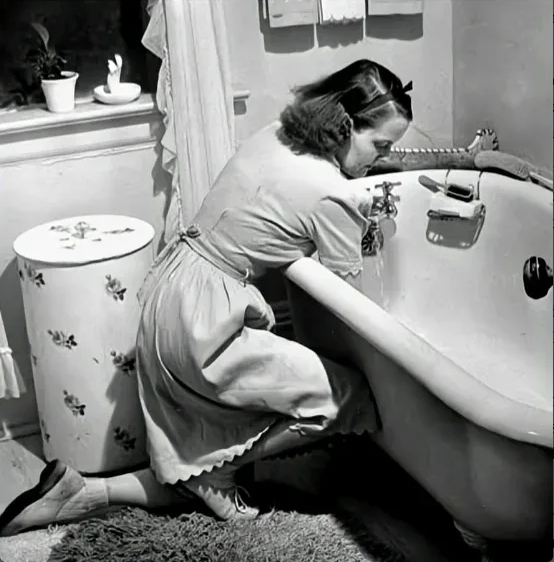
Margaret Porter knelt beside her Kankakee bathtub in March 1941, scrubbing while her children were at school. Three weeks earlier, her husband Thomas had enlisted. Before leaving, he’d said words that would shape how she spent every moment he was gone: “Keep our home just as it is, Maggie. When I close my eyes, I need to see it clean, safe, and warm.”
So she scrubbed. Each motion a prayer. Each swipe of the cloth a message sent across whatever distance separated them: We’re here. We’re waiting. Everything is exactly as you left it.
That afternoon, she found his letter tucked under the soap dish. He’d hidden it there before leaving, knowing she’d discover it during her routine cleaning. The note said simply: “Teaching our children that dignity lives in every task—they’re watching you.”
She looked at her reddened hands. She wasn’t just cleaning. She was showing them what love and care looked like. She was demonstrating that when someone you love is in danger, you keep your promises. You maintain the home they’re fighting to return to. You honor their request even when they’re not there to see it.
The black and white photograph captures her kneeling beside the bathtub, her floral dress spread around her, cleaning supplies visible, curtains hanging at the window. She’s focused entirely on her task, unaware of or unconcerned with the camera. This is just another day of keeping her promise, another prayer scrubbed into porcelain.
March 1941. America wasn’t officially in World War II yet—that wouldn’t happen until December. But Thomas had enlisted anyway, one of the men who saw what was coming and chose to serve before being called. He left behind a wife and children, a home, a life he hoped to return to.
And Margaret kept that home exactly as he’d asked. Clean, safe, warm. Not because she was obsessed with housework, but because she’d promised. Because somewhere, Thomas was closing his eyes and picturing this bathtub, this home, his family safe in the house he’d left behind.
“Keep our home just as it is, Maggie.”
It’s such a simple request that carries enormous weight. He’s not asking her to freeze time or pretend he’s still there. He’s asking for constancy, for proof that the world he’s fighting for still exists. That when he closes his eyes in whatever dangerous place he finds himself, he can picture this bathroom, this house, his wife keeping their life intact until he can come home to it.
She scrubbed each motion as a prayer. Because what else do you do when someone you love is in danger and you’re powerless to protect them? You keep your promises. You maintain the routines they asked you to maintain. You pour your anxiety and fear and love into ordinary tasks that suddenly become profound.
The letter under the soap dish is almost unbearably tender. Thomas knew his wife well enough to know she’d find it while cleaning. Knew she’d need that encouragement. Knew she might question whether all this scrubbing mattered when there was a war happening and her husband was gone.
“Teaching our children that dignity lives in every task—they’re watching you.”
This transforms Margaret’s cleaning from household chore into moral education. Her children are learning that you honor commitments even when they’re difficult. That caring for your home is a form of love. That dignity exists in every task when you approach it with intention and purpose.
They’re watching her kneel beside this bathtub and learning what it means to keep faith with someone who’s absent. To maintain hope through routine. To show love through consistency.
Margaret looked at her reddened hands and saw more than the physical evidence of scrubbing. She saw proof that she was keeping her promise. That Thomas’s home was exactly as he’d asked it to be. That when he closed his eyes wherever he was, he could picture this clean, safe, warm house and know his family was okay.
She wasn’t just cleaning. She was showing her children what love looks like when it’s tested. What commitment means when it costs something. What faith looks like when the person you’re keeping faith with might never come home.
The photograph doesn’t tell us if Thomas returned safely. We don’t know if he ever came home to the clean bathtub, the children who learned about dignity through watching their mother scrub, the wife who turned household tasks into prayers.
But we know that on this day in March 1941, Margaret Porter kept her promise. She scrubbed that bathtub like it mattered—because it did. Not because of the bathtub itself, but because of what it represented: constancy, love, hope, the belief that normal life would resume when the war ended.
Her children watched. They learned. They saw their mother maintain dignity in every task. They understood, even if they couldn’t articulate it, that this scrubbing was about more than cleanliness.
It was about keeping faith. About loving someone even when they’re far away. About maintaining hope through the simple act of keeping your home clean, safe, and warm.